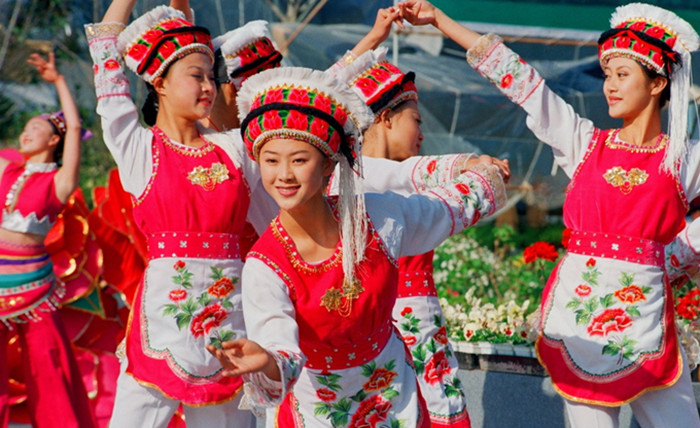

 At the foot the Blue Mountain and on the banks of the Erhai Lake, there lives the Bai people-which is also known for the movie Five Golden Flowers.
At the foot the Blue Mountain and on the banks of the Erhai Lake, there lives the Bai people-which is also known for the movie Five Golden Flowers.
As one of the ethnic minorities in China, the Bai nationality has a population of over 1,590,000. The Bai people inhabit mainly Dali Bai Autonomous Prefecture, Lijiang Bijiang, Baoshan, Nanhua, Yuanjiang, Kunming, An'ning, etc.  Others are also scattered in Dayong and Sangzhi of Hunan Province, Bijie of Guizhou, Liangshan of Sichuan and some other places.
Others are also scattered in Dayong and Sangzhi of Hunan Province, Bijie of Guizhou, Liangshan of Sichuan and some other places.
The Bai People call themselves "Bai," "Baizi," "Baini" or "Bairen." People of other nationalities also call them "Minjia," "Lebu," "Lema," "Lemo" and so on so forth. In history books of Yuan and Ming Dynasties, they are referred to as "Bairen" or "Boren." In November of 1956-after the founding of the People's Republic of China-they are called by a joint name, the Bai nationality.
Now, the Bai people have their own spoken and written language that belongs to the Tibeto-Burman branch of the Sino-Tibetan Language family. It is a combined form of Chinese, Tibetan and Burmese. Among the three language systems ever applied by the Bai people in history-Chinese, the Bo language (an ancient language written as Chinese but read in the Bai people's way) and Sanskrit-Chinese was the most widely used. In 1950s, a Bai written alphabetic language was created, and in 1980, the Bai-Chinese bilingual education achieved success.
The Bai people live mainly on farming, also on fishing, stock raising and handicraft industries. The main food crops are paddy rice, wheat and corn, and their economic crops include sugar cane, tobacco, tea, etc.
Most of the Bai people are worshippers of "a communal god," but some of them believe in Buddhism, Taoism or Christianity. In history, there was a time when cremation prevailed; yet, after Ming dynasty, inhumation had gradually become the main form of burial.
In terms of traditional festivals, there are festivals and congregations like Torch Festival, "Communal God" Festival, March Fair, Yutanhui and Raosanling.
As a people with a long history and highly developed culture, the Bai has made outstanding achievements in architecture, medicine, historiography, pedagogy, literature, music, dance, drama, painting, engraving and some other aspects.
You will only receive emails that you permitted upon submission and your email address will never be shared with any third parties without your express permission.
